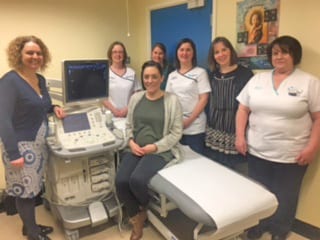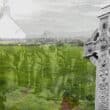
Sonographers in the Southern HSC Trust are receiving specialist fetal cardiac training to help detect babies with heart defects during pregnancy scans.
Each year there are around 24,500 babies born in Northern Ireland. Around 200 babies will have a life-threatening heart condition.
Early detection of these heart defects before birth means the babies’ delivery and care after birth can be carefully planned to give every baby the best chance of survival. Finding out that their baby has a heart condition before birth also helps prepare parents and families for the birth of their baby.
The charity Tiny Tickers, working with the Health and Social Care Board and the Public Health Agency, has committed to provide training to every sonographer who performs the 20 week scan in the Health and Social Care Trusts. More than 90 sonographers in hospitals across Northern Ireland will be provided with hands-on training to help them to detect congenital heart defects (or CHD) in babies.
The training will cover the most up-to-date recommendations on what sonographers should be looking for when they are looking at the heart as part of the 20-week scan.
There are five views of the heart which should be obtained during the scan. The most recent addition is the 3 vessel and trachea or 3VT view.
Sonographers attending the training will receive training on how best to carry out the cardiac part of the 20-week scan, including this relatively new addition to the scan.
The hands-on training is being made possible by generous funding provided by Tiny Tickers ambassadors, former champion jockey Sir Anthony (AP) McCoy and his wife Chanelle.
Tiny Tickers’ Chief Executive, Jon Arnold, said: “Tiny Tickers is here to help sonographers – giving them the skills and confidence to spot when a baby’s heart doesn’t look normal.
“Spotting a defect during a 20-week pregnancy scan can be very difficult, so we’re giving sonographers all the support we possibly can – including our experts going into local units across the country to train staff and theory conferences.
“We know the difference early detection makes for these babies and our training scheme is already delivering real measurable improvements.”
Dr Joanne McClean, Consultant, the Public Health Agency thanked Tiny Tickers for their support. Dr McClean said: “We are delighted to be working with Tiny Tickers on this project.
“The Tiny Tickers training is part of an initiative aimed at improving the antenatal and subsequent cardiac care available for children across the region.”




